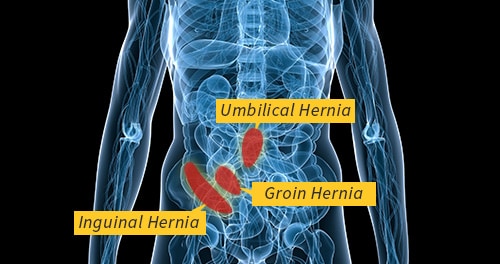What Is A Hernia?
A hernia occurs when an organ, such as part of the intestine, protrudes through a weakened section in the abdominal wall. This protrusion often results in a visible bulge or lump under your skin.
Hernias are usually caused by activities that put too much pressure on the abdomen, such as heavy lifting, excessive straining during bowel movements, or coughing. Your risk of getting a hernia also increases if you are overweight.
There are several types of hernias, depending on where the protrusion occurs:
Inguinal Hernia (Groin Hernia)
Inguinal hernia occurs near the groin area. It develops when your intestinal tissue protrudes through a weak spot in the abdominal wall at the inguinal canal, which is near your pubic bone. Males are more likely to get inguinal hernias than females.
Symptoms include:
- A dull pain or discomfort at the groin area, particularly when coughing, lifting something, or bending over.
- A bulge or lump at the groin, or near the pubic bone. It may become more prominent when you are upright.
- A heavy or dragging sensation in your groin, which may be relieved when sitting down.

Umbilical Hernia
An umbilical hernia creates a protrusion or bulge near the navel. While it usually occurs in babies and children, umbilical hernias may also occur in adults. People who are overweight, pregnant, or have too much fluid in the belly are more likely to get umbilical hernias.
Hernia Complications
You may not experience any symptoms or discomfort when the hernia is still small. It is also possible to push your organs back into position at this stage. However hernias may become larger and more painful over time, and may even lead to life-threatening conditions such as bowel obstruction and strangulation. If you suspect that you have a hernia, or observe a noticeable bulge at the abdominal area, seek medical advice before it worsens. Your doctor will do an examination to confirm your symptoms.
Seek medical help immediately if you notice a sudden enlargement of the abdomen, experience pain in the abdomen area or if the hernia bulge changes colour.
To make an appointment, select "Specialist Appointment". Under Specialist Appointment Details, select "General Surgery" and include Hernia in the Remarks.
Treatment for Hernias
There are two general approaches to surgical repair and your doctor will discuss the benefits and risks of each surgery with you.
Open hernia surgery
A cut is made directly at the site of the hernia and the protruding tissue will be pushed back into the abdomen. The weakened area will be reinforced with stitches and / or mesh. The incision is then closed with stitches or clips.
Laparoscopic surgery
Several small incisions will be made in your abdomen. Gas is used to inflate your abdomen so that it is easier to see the internal organs. A small tube equipped with a tiny video camera is inserted into one of the incisions and tubes will be inserted through other incisions to pass tiny instruments through. The weakened muscle area is repaired from the inside with a mesh. The tubes are then removed and the gas released. The incisions are then stitched together.
Make An Appointment
Make an appointment or contact the surgery centre to consult a surgeon. To make an appointment, select "Specialist Appointment". Under Specialist Appointment Details, select "General Surgery", and include Hernia in the Remarks.
Make an enquiry. We will get back to you within 2 working days. You can reach us at 6311 1140.